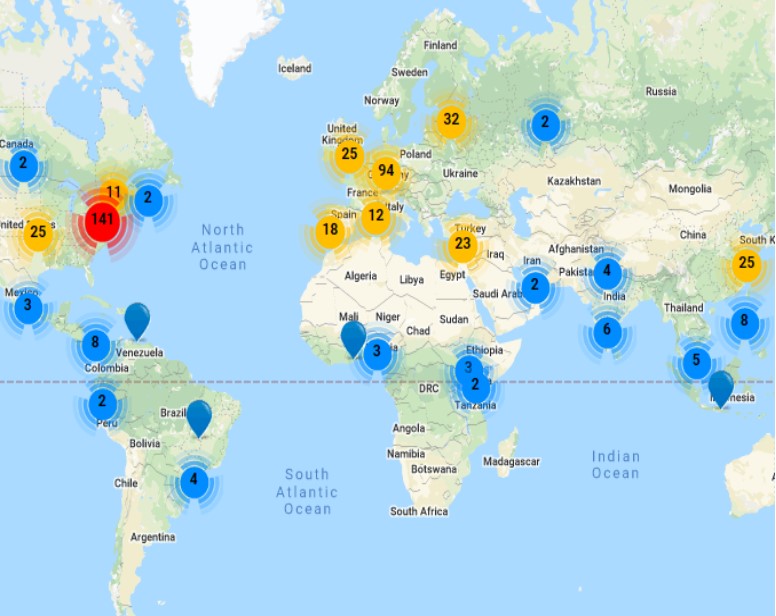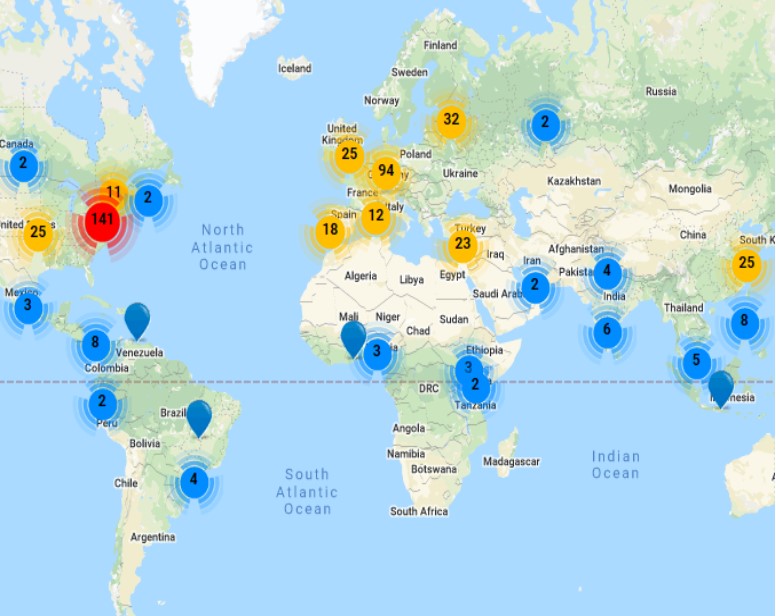Startups breathe, live, and grow within successful ecosystems. They cannot survive on their own and need a supportive home to be able to flourish. A Startup Ecosystem is a complex and interconnected structure that operate well when everything is in balance.
The most successful startup ecosystems have a strong shared vision and a mission to change the world through innovation and growth while at the same time supporting their communities. The highest-ranked ecosystems are able to attract foreign investors and top talent, secure opportunities, and provide their members with the resources necessary to scale and grow.
Related Article: A Guide to Startup Ecosystem Development
Are you interested in startup innovation and entrepreneurship? You can access more reports on global and regional economic development as well as our new Coronavirus Innovation Map that shows the best countries fighting the pandemic and facilitating new developments in the pandemic era.
The startups
The most vital part of the equation and core component of a startup ecosystem is naturally the startups themselves.
According to Investopedia, a startup is a “young company founded by one or more entrepreneurs to develop a unique product or service and bring it to market”.
Startups cover a wide range of industries and sectors but are marked by the birth of a new idea or solution that can create impactful change in the world.
Startup Blink analyzes thousands of startups for our annual Global Ranking Report, and our definition reflects the process and methodology of selecting and evaluating and ranking the top performers.
“A startup is any new business that applies an innovative solution. The innovation can be either technological or a unique business model.”

The educational providers
After the startups, the ecosystem requires schools, universities, colleges, and programs that for starters can provide the drive or enthusiasm to pursue entrepreneurship and at a later stage foster necessary skills. In countries, where innovation and growth are not actively encouraged from a young age, there is a lack of startups and entrepreneurial ventures observed. The European ecosystem is one example, where lack of entrepreneurial culture has negatively affected individuals from pursuing new innovative solutions or ideas. In addition, education providers can help to shift the traditional mindset of what an entrepreneur or successful business person looks like, away from gender norms and an older and more mature demographic and encourage young people and women to get involved, especially in areas where women, in particular, have been discouraged from pursuing entrepreneurial ideas.
To address this challenge and move towards a new era of cultural mindset, the EU has launched a variety of programs focusing on education like European Maker Week and Erasmus for Young Entrepreneurs.
While addressing the cultural mindset in education is important in the starting stages, colleges and universities can also contribute to the demands of the job market, and prepare students accordingly for the challenges and skills that will be needed to become members of the startup ecosystem. This can be achieved through projects, courses, hackathons, pitching competitions, and recruiting programs.
Estonia notably launched a program in 2012 that included coding as part of their school curriculum for children as young as 7. This kind of forward-thinking approach to the skills of the future doesn’t just give children the tools necessary to live and think within our digital world but creates new solutions and allows them to feel comfortable claiming it as their own.
Some universities like Stanford, have interlinked with the local startup ecosystem to such a degree, they are boasting the creation of more than 3 thousand companies, and 53 unicorns, and funding of over 90B. Some of the startups founded by Stanford University alumni include Patreon, WhatsApp, Netflix, and Expedia and there is even a dedicated Wikipedia page covering all of the companies.
The Investors and Funding Organizations
One of the biggest obstacles for new startups to overcome is funding. Most startups rely on self-funding options like government loans and support from friends and family for their development stages. However, when it comes to startups in countries with a high cost of living, securing funding is crucial and can bring on early death or dissuade individuals from taking those first steps. Angel investors, venture capital firms, and government support, whether it is a grant, loans or prizes are a vital component of startup ecosystems.
A strong startup ecosystem is in a better position to attract and retain foreign investors, who tend to favour regions with a proven ROI track record and healthy movement.
Support Organizations
The role of support organizations encompasses education, opportunity, networking, and densely packed physical hubs where ideas can blossom and become reality. Support organizations are incubators, coworking spaces, and accelerators.
One study in Southern Europe found that startups that were part of support organizations that included mentoring increased their revenue by 83% compared to 16% for non-mentored businesses. The Asia Pacific region has also seen an increase in the number of coworking and support organizations spaces operating, providing flexible workspaces in places with prohibitive real estate fees like Hong Kong.
In addition, coworking spaces appeal to a wide range of professionals, freelancers, digital nomads, independent contractors, and creatives, that cluster around these spaces to work and socialize from, and in the process exchange ideas or even forge new business alliances.
Y Combinator is one example of an accelerator program that has attracted thousands of entrepreneurs and provides funding and education for startups in exchange for a small stake. They also run the Startup School, a free online program and vibrant community of global founders that provides the support and structure needed to take an idea and turn it into a plan that can attract investors and become a functional company.
Private Sector Individuals
Another component of a startup ecosystem is the private sector individuals such as ecosystem developers and associations that often work together with the public sector to remove obstacles and allow for smooth movement and growth within the ecosystem.
The Components of a Startup Ecosystem
A successful startup ecosystem is like a well-oiled machine and requires a wide range of tools or moving parts to work together in harmony. There are support structures necessary, like funding providers and government support as well as the individuals that are part of the ecosystem. When it comes to human capital, startup ecosystems need entrepreneurs, mentors, and freelancers to work together under creative hubs, exchange ideas, and power new initiatives. That in turn creates the need for the physical structures that can host and nourish the teams, like coworking spaces or incubators that can also provide mentoring and funding opportunities. Ecosystem developers and public sector government officials have a vested interest in allowing these communities to grow and eliminate obstacles that can dissuade individuals from pursuing innovation. Their role is more crucial in the beginning or developing stages of a startup ecosystem, and afterward can be focused on less active support mechanisms.











People reacted to this story.
Show comments Hide comments[…] key to ecosystem sustainability is the smooth and harmonious co-existence of all the components. In addition to the startups themselves, this includes the educational providers, incubator and […]
Comments are closed.